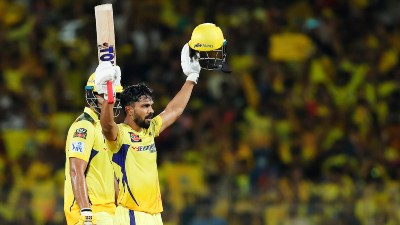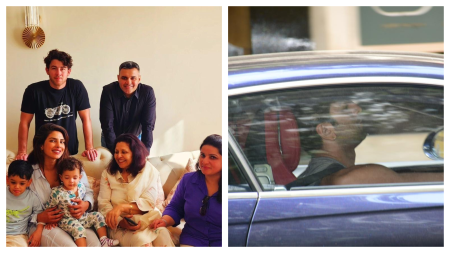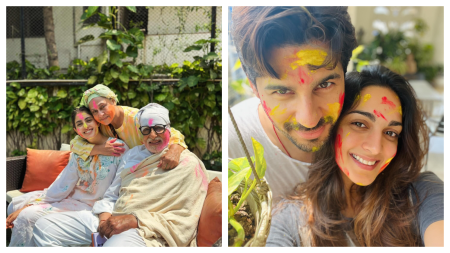- India
- International
T-Series’ Bhushan Kumar: I work for my audience and listeners
Bhushan Kumar talks about keeping T-series relevant, having 22 films already locked for 2020 and tackling Bharat star Salman Khan's sense of humour.
 Bhushan Kumar’s production venture Bharat will hit screens on June 5.
Bhushan Kumar’s production venture Bharat will hit screens on June 5.
Golden trophies fill a double-decker shelf which covers the entire width of this T-Series room, screaming volumes about the legacy of the biggest music label in India. Its owner Bhushan Kumar, who is otherwise a recluse, is in a chatty mood today, courtesy the last leg of his upcoming production, Bharat.
Bhushan sits down with indianexpress.com and proudly talks about keeping T-Series relevant and having 22 films already locked for 2020.
At the launch of Bharat song “Zinda”, you joked about how Salman Khan wasn’t happy with the way the film was being promoted.
Salman bhai has a habit of pulling my leg every time. That you can make out from his straight face that he is not serious about it.
But is there a pressure on T-Series because it’s a Salman Khan film?

No. The film’s music took longer than it should have to get established on top of the charts. There is a reason for it. Actors feel it is because of promotions but that is not true because Bharat’s songs are from different periods in history. They aren’t out and out commercial songs like in Tiger Zinda Hai, which became huge instantly. In Bharat, you can’t make commercial music.
From an actor’s point of view, he was feeling earlier that music was not becoming popular. That had nothing to do with promotions. It is my own film. I am promoting it like mad. Today, the music is topping the charts.
How does a brand like T-Series, which has a legacy to live up to and battle new competition, stay relevant?
That’s what filmmaking is all about. If you don’t have that kind of sensibility to judge these things then you aren’t fit to be a producer. We have a good sense of judgement and it’s growing. We know what kind of music people want to listen and we are doing the same with films. We know what kind of stories people want to see. Earlier people had tagged us that T-Series only does musicals but now that label has gone away.
People have understood that we will be true to our films and we will try to put in songs that go with the story and they are not there for the sake of it. We have good creative minds like Luv Ranjan, Nikhil Advani and Remo working with us. Their sensibilities merge with ours. And when your films do well, you know people are getting connected to your content. So, we are getting confident about our script sense.
Was there ever a time in the last few years when you had to rethink on how to take T-Series forward? Did the criteria to choose scripts change?
While we have been doing music for decades now, we are fairly new in film production. Earlier I used to do films occasionally and less as a business. From past two years, when we really began, our graph has only been upwards. In the first year, we made four films. In the second year, we had seven. This year, the number is 18 and we already have 22 films for 2020. For 2021, we have already decided on five-six projects. All these are co-productions where I am the principal producer. I don’t think we have got anything to rethink about.
You have spoken about how as a producer, your involvement at the script level is massive. So, what are the things that you look for in a script? What are your check boxes?
First of all, all entertaining films work. People used to say only content-driven films work these days. Then Total Dhamaal came and worked. People said it was a fluke. But before that, Simmba came and worked superbly. When I made Satyamev Jayate, which is a typical Hindi action masala film, people told me it won’t work because only real cinema worked. But it was a hit.
So, what I have gathered is whenever you are listening to a script, you shouldn’t go for it only if it is a real drama. If you read my interviews from six months ago, I was repeatedly saying how only realistic films were working. But you have to change according to your audience’s taste and that is, everything that’s entertaining works. It should have great music. If you are making a realistic movie, then the lead characters should be really powerful like how we have made Kabir Singh, whose protagonist is extremely relatable.
(When) people come to the theater, spend two-three thousand rupees per family, they want to be entertained. They don’t want to feel they made a bad investment. That’s what we keep in mind while selecting a film.
If you get a script that’s powerful but you believe it might not be able to pull in audience on its own, do you outrightly reject it or suggest the writers “commercial” elements or try to get a big star to make it more viable?
If it’s a real, serious film and we like its structure but it doesn’t sound entertaining, we tell the writer/director to make it entertaining. If he or she is not able to do, obviously, we don’t take up that film. The most important thing is if my team is listening to a script, we shouldn’t be bored because we listen like an audience. We don’t want to do a film because some actor is doing it or for any other such reason.
We have enough branding today. The kind of marketing we do and the music we put, many directors and producers get excited about working with me. People like Nikhil Advani and Luv Ranjan only work with me. They tell us, ‘We don’t want to work outside.’ So, there’s no such insecurity that we might not get more films in future so let’s do whatever we get.
While superstars claim that they are at the mercy of big production houses like yours, producers have spoken openly about the star-obsessed culture in the industry. How does a producer maintain his or her individuality in a place, which is star-dependent?
I don’t think the star culture is prevalent anymore. It used to be earlier. But right now, the correct content is working. A big example is Irrfan Khan’s Hindi Medium. Before that, the highest any of his film earned was Rs 30-32 crore (Talvar). We made Rs 68 crores on a film that was made on the budget of Rs 15 crore. This happened because of the content. I didn’t have a big star. There are many films of the stars and I don’t want to name them, which did less than the business of Hindi Medium.
On set, who is the boss? The producer or the superstar?
The director is the boss on the set. We don’t take away anyone’s creative freedom. There are many production houses which get into creative calls. I just give suggestions. For music, I definitely tell them, ‘We know better than you, so please put songs, which not only go with the story but can also stand on their own and be good for the music label.’
We also give our suggestions for cinematographers. Sometimes, directors have an emotional connect with particular DOPs. If we think there are professionals better than them, we request the directors to not get sentimental. But we don’t interfere in various script improvisations, editing and rest of the things.
Talking about music, what most of the composers seem to have in common is their discomfort with recreations. Amit Trivedi famously said…
(Interrupts) Tell him to make great songs which work with public. You can officially quote me.
So, this would be your response to music composers who say they have the pressure from music labels to do recreations and if it weren’t for the labels, they would never indulge in the trend?
I am just joking. The thing is Amit Trivedi, Shankar-Ehsaan-Loy, all of them are great composers but as a music label, I have to cater to my listeners. I can’t see what music composers want. There are phases. My father (Gulshan Kumar) made cover versions, which were legal, but people used to criticise him, asking, ‘Why would you make cover versions of hit Kishore Kumar songs?’ But because of that, Kumar Sanu came, Anuradha Paudwal got a break, Sonu Nigam came, Babul Supriyo got recognised. That generation wanted to listen to old songs in new voices.
After that came the phase of pure remixes. They were same songs but new sound and a great video, which featured a little erotica. That faded away and made way for pop songs. You have to go with the taste of the listeners and the time. Today’s listeners want to listen to recreations. We use the essence of the old song and rest of the aspects are new.
All these composers criticise remakes and put it on music labels but the same people are working with me also. You ask Amit Trivedi, ‘So, you have decided not to work with T-Series and all the music labels?’ He will say, ‘No, I would love to work with them.’
But they are at your mercy. Music labels are bigger than composers.
No, it is not like that. I work for my audience and listeners. I am very ruthless when it comes to my audience.
A section of listeners believe the trend of recreations shows there is not much originality left in Hindi film music.
That’s just one per cent of them. Why should I react to them? I will tell them, ‘With due respect, if you don’t like it, don’t listen to it.’ You look at Twitter or YouTube, it’s not even one percent. But yes, the recreations should be done properly.
You said in an interview that you can’t hire anyone to guide you on music. Isn’t it a lot of pressure to depend only on your own sense?
I have a team. I don’t work alone. I have got it from my father and my music team is getting it from me. How do you get the sensibility? If you select a song and it works, you know you are right.
Tell me about the albums which exceeded your expectation.
I remember Mukesh Bhatt ji got the music of Murder to me. I heard the songs and at that time, movie titles used to play a huge role in marketing of its music album because cassettes were very popular. So, my analysis was why would someone buy a cassette which has Murder written on it. But I was wrong because those songs became superhits.
Even with Rang De Basanti whose music I was about to buy. I listened to its songs and still didn’t feel they would do well. Rakyesh Omprakash Mehra kept telling me they would work and they just didn’t connect with me. These were my learning periods.
Playback singers like Sonu Nigam and Shaan say one of the reasons they don’t get many opportunities today is because music labels prefer their own artistes. Is that true? Is there a specific reason for the industry to not give these voices songs?
That’s not true. Yes, we have our exclusive artistes and they share revenue from shows and other things with us because we give them great songs but that doesn’t mean we don’t want old singers. These are iconic singers. It’s just that today people don’t want their characters to have a Sonu Nigam voice, they want them to have voice of Arijit Singh, Jubin Nautiyal and Armaan Malik.
It depends on the characters that the directors are particular about because I keep on fighting with them. They even refuse our singers, so we have to take artistes from outside. Like for Bhuj: Pride of India, which is a war film, we have taken Sukhwinder Singh and Shreya Ghoshal because they suit that era. Everything is character-driven.
At times, the directors go like, ‘Today’s youth get more connected to young voices.’ There are a lot of factors. With due respect to these singers, who are doing well in their careers as they are doing a lot of TV, for new songs, there are challenges.
Photos
Apr 24: Latest News
- 01
- 02
- 03
- 04
- 05








































